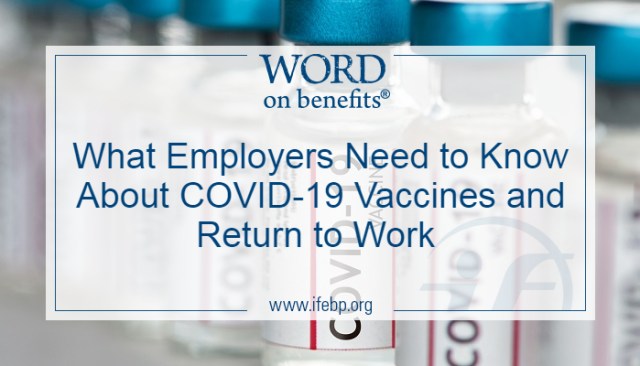
When it comes to the COVID-19 vaccines and returning to the workplace, there’s a lot for employers to consider—and the time to start planning is now. A recent webcast, COVID-19 Vaccines: Implications for Canadian Employers, explored the key issues.

COVID-19 Vaccine Distribution in Canada
Professor Alan Whiteside from the Balsillie School of International Affairs provided an update on the COVID-19 vaccines and where we are in the distribution process. Currently, three vaccines are available in Canada—from Pfizer, Moderna and AstraZeneca—and two are close to approval, from Novavax and Johnson & Johnson, said Whiteside, adding that the Chinese and Russian vaccines have also been very effective.
“The prize will be the one that stops people getting sick and stops them from passing on COVID,” he said, noting that with the current vaccines, transmission may still be possible even if you are vaccinated.
A year into the pandemic, we are starting to see the light at the end of the tunnel. But compared to other countries, Canada is lagging in distributing the vaccines, said Whiteside. The slow rollout, combined with the time it will take to achieve herd immunity, means Canadian workplaces will be impacted for some time.
Legal Considerations
In an environment where provincial or federal governments are unlikely to mandate vaccination, can Canadian employers make it a workplace requirement? “My conclusion is, yes, I do believe that employers can mandate vaccination,” said Stephen Wolpert, a partner with Whitten & Lublin Employment Lawyers.
Occupational health and safety legislation requires employers to take every reasonable precaution to protect a worker, he explained, and an argument can be made that coming to work unvaccinated could endanger yourself and others. He compared it to safety equipment: You can require a worker to wear boots and goggles as a condition of employment, so you may be able to do the same with a vaccine.
But it’s not a simple decision. Employers need to consider the following:
- If you don’t mandate vaccination, what policies and measures will you put in place to keep your workplace safe? What will you do with employees who are uncomfortable showing up for work?
- If you do mandate vaccination, what is the timing involved, and how will you handle the transition? What kind of evidence will be required (e.g., vaccination card, doctor’s note, etc.), and how will you address employees who won’t comply? What about exemptions (e.g., for health or religious reasons)? What about customers and vendors entering your workplace—What rules will apply to them?
“Just because you can mandate vaccination, in my opinion, it doesn’t necessarily mean you should—and it doesn’t mean it’s an easy thing to do,” said Wolpert.
He recommends that employers start the planning process by creating a mandate on vaccination, identifying exemptions and then tailoring it to their business needs. If you are planning to mandate vaccination, Wolpert advises telling employees sooner rather than later.
Finally, employers should know that adjustments will need to be made over time, and they should be fair and transparent in how they implement changes. “A policy need not be perfect to be useful,” Wolpert noted.
A New Era of Flexible Work
The COVID-19 pandemic has brought about a shift in mentality on how we view flexible working, said Hailey Fugman, a principal at Mercer. The dialogue used to be around flexibility from work; now, it’s shifting to flexibility at work, she explained.
And it’s no longer a “nice to have.” According to Mercer survey data, 1 in 3 organizations anticipate having half or more of their workforce working remotely post-COVID, and 83% will continue to offer greater flexibility to their employees.
Offering flexibility is beneficial for both employees and employers, noted Fugman. “When employees have choices and they can build a work plan that really works for them, we see an increase in productivity.”
In many cases, people do want to come to the physical workplace for one or two days a week for team building and socialization, she said. Employers will need to take a closer look at how their infrastructure will be affected, as well as which policies and programs need to be adjusted.
Fugman shared four key next steps for employers to consider when exploring their capacity for flexible work:
- Start shaping your strategy.
- Explore an inclusive approach that embraces flexibility for all.
- Assess the capacity of jobs.
- Engage with leaders and employees.
“Our belief is that the future of work is flexible, but it’s about a lot more than remote working,” she added.
[Related Reading: How to Navigate Remote Work and Help Employees Thrive in 2021]
Learn More About the COVID-19 Vaccines and Implications for Canadian Employers
Join your fellow International Foundation members on Tuesday, March 16, 2021 (11 CDT/12 EDT) for a virtual Community Meet Up on workplace considerations surrounding the COVID-19 vaccines. Brainstorm and share your views on access and distribution, privacy issues, workplace safety considerations, impact on return-to-work strategy, how this will compare to handling the flu vaccination, questions for your legal counsel, and anything else you’d like to discuss on this topic. Register here.
Watch the full webcast on-demand: COVID-19 Vaccines: Implications for Canadian Employers.
Employers and plan sponsors can find more resources for navigating the pandemic and supporting workers on the International Foundation Coronavirus Resources webpage.
![]()
Alyssa Hodder
Director, Education and Outreach – Canada

The latest from Word on Benefits:
- Mental Health Parity: What Plan Sponsors Need to Know During Period of Nonenforcement of 2024 Final Rule
- CMS Creditable Coverage Updates for Group Health Plans
- The New Look of Virtual Care: What’s Right for Employers and Plan Sponsors?
- Ontario’s New Long-Term Illness Leave Takes Effect Soon: What Employers Need to Know
- What Benefits Are Working? Attracting and Retaining Employees





